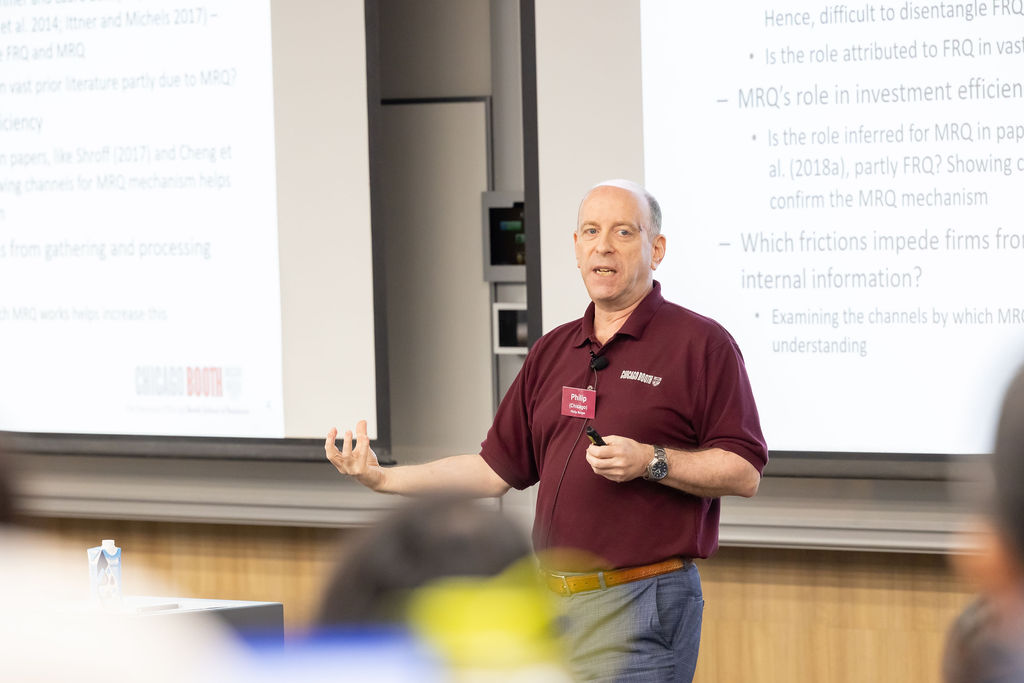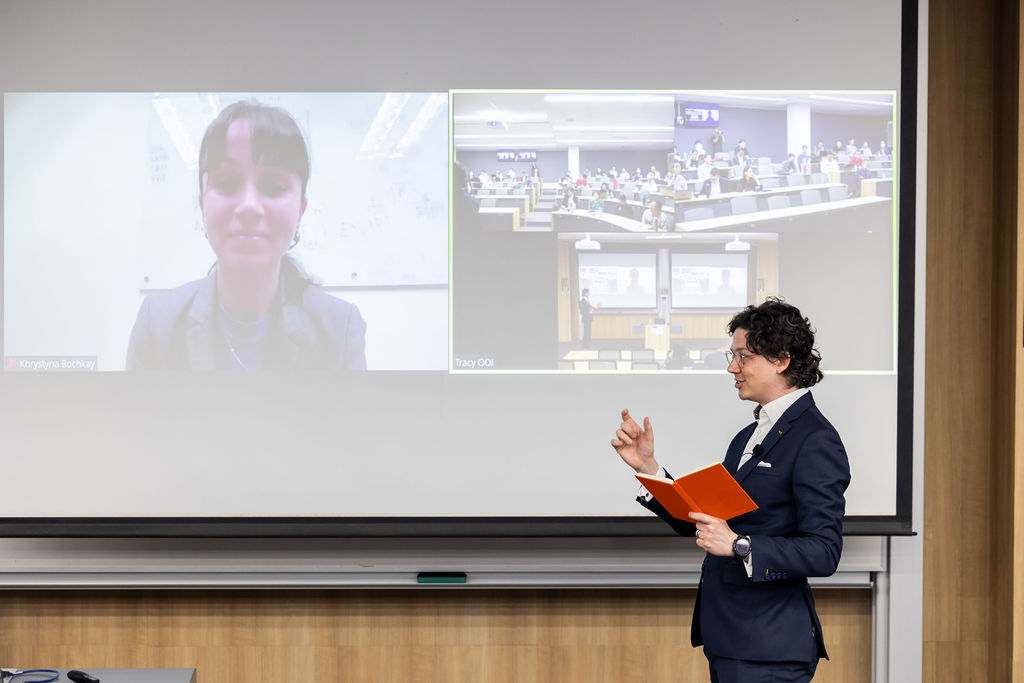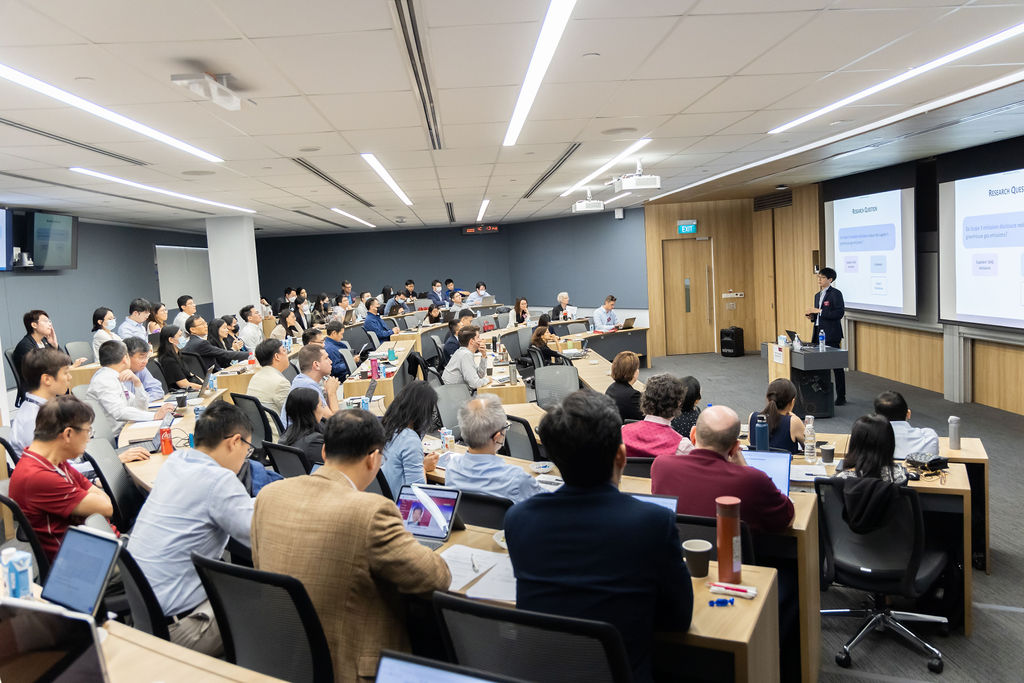
Dr Zhang delivering the opening speech for the event
Held on 20 and 21 December 2022, this year’s SMU School of Accountancy Research (SOAR) Centre Accounting Symposium marked a welcome return to an in-person format – held in the University’s Yong Pung How School of Law building.
A platform for researchers from SMU SoA and top global institutions of higher education, the annual flagship symposium attracts submissions from leading accounting scholars around the world. The 2022 iteration of the event covered topics ranging from reporting relating to environmental, social and governance (ESG) factors, and research through a financial reporting lens, to analysing investor sentiment employing a method using natural language processing and machine learning.
This year, said SMU SoA Associate Dean (Research) Liandong Zhang, Lee Kong Chian Professor of Accounting, there were nearly 100 submissions for the symposium, which the SOAR committee curated to ensure diversity in topics and region of authors, as well as quality. The high volume of quality research is a positive reflection on the Centre’s efforts to elevate knowledge creation, thought-leadership and innovation in the fast-changing field of accountancy.
ESG-related Reporting and Research from a Financial Reporting Perspective
There’s no question that ESG reporting has emerged as a vital tool for assessing a company’s long-term sustainability and viability. Besides profits and losses, ESG issues can have a significant impact on a company's bottom line. For example, a company that experiences negative publicity or regulatory scrutiny due to its ESG track record may see its stock prices decline or it may be fined. Additionally, companies that pollute or engage in unethical practices often face higher costs than those that do not. As such, it is imperative for businesses to understand the full scope of their ESG risks and opportunities to make sound financial decisions.
The symposium kicked off with a thought-provoking presentation by keynote speaker, Duke University Thomas F Keller Professor of Business Katherine Schipper.
Dr Schipper initiated a series of questions to examine the current state of ESG-related reporting and research, in particular, she zoned in on common assumptions made by regulators in governmental and professional bodies such as the International Financial Reporting Standards Foundation, which created the International Sustainability Standards Board (ISSB). Founded in 2021, the Board strives to set standards for reliable and transparent ESG reporting by companies. To this end, it has adopted the long-established International Accounting Standards Board (IASB) – that is, financial accounting’s structure – as the framework of its new board.
Such a move, however, has led to a mismatch, said Dr Schipper, as financial reporting is a means to an end, and has a ‘worked-out objective’. It provides specific information to enable a company and its shareholders to decide on maximising financial resources for strong returns.
ESG reporting, on the other hand, aims to spur a company towards “green goals” — and are based on factors that are not always financially measurable. While corporate governance may easily use the structured form of financial reporting, the sustainability and environmental components of ESG reporting lack similarly agreed-upon categorisations.
Citing the findings of several papers which questioned the statistical results, and examining some use cases by the ISSB, she concluded, “It might be a little bit short-sighted and possibly inefficient to try to make ESG reporting as analogous as the ISSB is appearing to do. Instead, it would make sense to examine the different kinds of information used and who uses them, and how we set the boundaries for ESG reporting in ways that are as useful as we have found in financial reporting.”
The Role of Managerial Reporting Quality in Investment Efficiency

Dr Berger presenting on "The Role of Managerial Reporting Quality in Investment Efficiency"
The first paper to be presented at the symposium was by Dr Philip G Berger, Wallman Family Professor of Accounting, University of Chicago Booth School of Business. He represented his co-authors Dr Feng Li of Shanghai Advanced Institute of Finance, Dr Lisa Yao Liu of Columbia Business School, and Dr Franco Wong of University of Toronto’s Rotman School of Management.
They examined the extent to which Managerial Reporting Quality (MRQ) improved investment information available to shareholders.
In the past, changes in management factors seem to have been considered part of financial reporting quality (FRQ) improvements – nice-to-have, but mostly invisible. But could it measurably be a result of better internal information efficiency, that is, MRQ improvements?
The authors found that while the results were less notable in “single segment” firms (those which focus on one geographical or demographic grouping); better investment efficiency emerged most clearly in multi-segment firms (spread out among different areas and societies). This was likely due to parts of the firm that differed from its headquarters in terms of operations or activity. When such segments increase the volume and quality of information sent to its HQ, shareholders, in turn, receive better information to steer their investment decisions.
SMU SoA Dean Dr Qiang Cheng, Lee Kong Chian Chair Professor of Accounting, who served as discussant for this paper, noted that the paper tackled an important aspect of the exact mechanism through which improved financial reporting (FRQ) affects investment efficiency.
He felt that the previous method, based mostly on changes in investments, was not as effective as the method used in this paper, which highlighted that changes in operational efficiency visibly helped companies do better.
The Dean made further suggestions, which included expanding explanations of compliance and external agency influences, and how proxies could be improved to measure the improvement in information being sent out – such as by using management forecast accuracy.

Dean discussing Dr Berger's paper
Corporate Disclosures for Green Supply Chains: Evidence from Scope 3 Emissions Disclosure
Dr Kim presenting his paper "Corporate Disclosures for Green Supply Chains: Evidence from Scope 3 Emissions Disclosure"
Dr Jungbae Kim, SMU Assistant Professor of Accounting, tackled the thorny topic of whether a company’s Greenhouse Gas (GHG) Protocol disclosures would have knock-on effects of “greening” its supply chain and by how much, in his paper “Corporate Disclosures for Green Supply Chains: Evidence from Scope 3 Emissions Disclosure”.
This paper, co-authored with SMU Professors – Dr Holly Yang, Associate Professor of Accounting, and Dr Young Jun Cho, Associate Professor of Accounting and Lee Kong Chian Fellow, discussed how Scope 3 disclosures from a firm’s value chain/suppliers can lead to clear improvements in suppliers’ emission results.
The US Securities Exchange Commission (SEC) requires companies to disclose their greenhouse gas emissions from all sources in their annual 10-K filings. There are three Scopes (1, 2 and 3) to the disclosures, and 1 (from the company itself) and 2 (from sources of power/heating/cooling that the company uses) are well-discussed in literature so far, noted Dr Kim.
Scope 3 emissions include greenhouse gases emitted from other suppliers – for instance, carbon dioxide from a supplier factory making parts and the ships bringing those products to the customer company.
“The question lies within upstream activities such as greenhouse gas emissions ‘embedded’ in the goods and services that are purchased from suppliers,” says Dr Kim. Central to their research was the notion that bad emissions results from suppliers could worsen the firm’s climate risks.
From the suppliers’ point of view, those with better emission controls are able to maintain contracts with more “green” customers.
The study’s sample took in 6,494 firm/supplier-years, between 2004 and 2019, particularly customer firms that were in 10K filings for the SEC. Overall, they found that where the economic ties between customer and supplier are stronger there was a greater decrease in the suppliers’ emissions, because of greater cooperation and information sharing – real “spill-over” effects on suppliers’ emissions activities.
They also suggested that regulators should consider the cost implications when requiring firms to make their Scope 3 emissions disclosures.
Understanding Sentiment through Context
Sentiment – or how stock markets and would-be investors feel about a particular firm/stock – has been employed for years by investors to decide on whether or not to buy into a product, and sentiment analysis has long been performed using resources such as the Loughran McDonald Sentiment Master Dictionary.
Such dictionaries help discuss “negative”, “positive” and “neutral” sentiments, but Dr Richard Crowley, SMU Assistant Professor of Accounting, points that there has not been consistent use of context for deciding what indeed is negative, positive or neutral.
Presenting for his paper co-authored with Dr Franco Wong of Rotman, “Understanding Sentiment through Context” Dr Crowley gave examples of how context changes how we react to sentiments. For example, the word “loss” has negative connotations in a phrase such as “net loss increase to 3 million”; but is less negative in “net loss was due to 4.7 million goodwill write-off”; or almost neutral as in “low-loss provisions”.
Dr Crowley and his authors extracted sentiments from documents in the management discussion analysis section of 10K submissions to the SEC, using Stanford University’s open information extraction (Open IE) program, as well as Loughran Mcdonald, Harvey’s Hypertextual Financial Glossary and the New York State Society of CPAs accounting terminology guide.
This brought them to about 48 million clauses, which they ran through Google’s “universal sentence encoder” to take out normal human-sentence words and clustered their results to remove duplication. They ended up with 137 different measures, which they again tested to see if the existing method to produce labels of “negative”, “positive” looked like they matched up with real-world results.
Net result? Their paper showed that prior literature’s expected results were often wrong, especially at a whole document level, because context needs to be considered.
“For most papers, just focus on whatever context makes sense for your theory. If you’re looking at tax, look at the tax discussion; if you want to look at one of your products, look at the product discussion — so focus on the context that’s relevant to the question,” Dr Crowley concluded.

